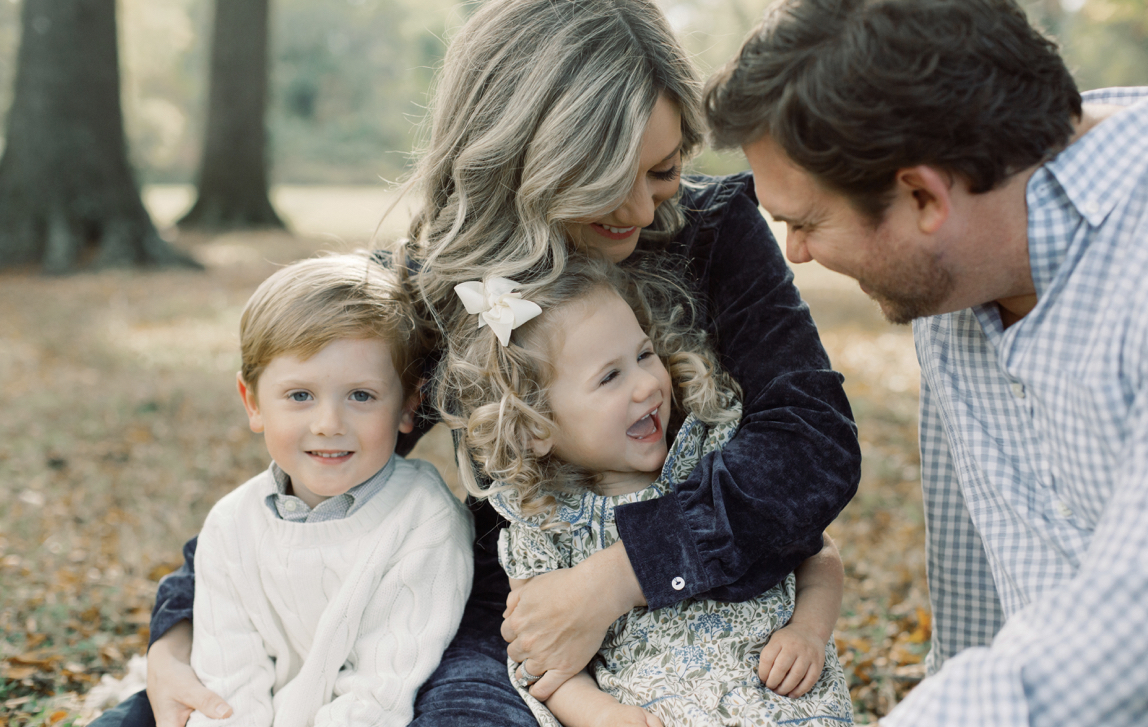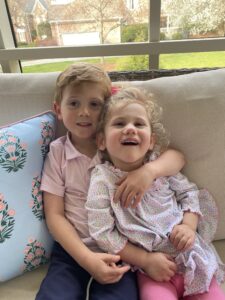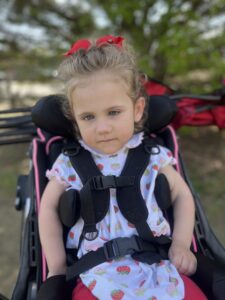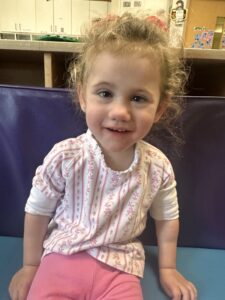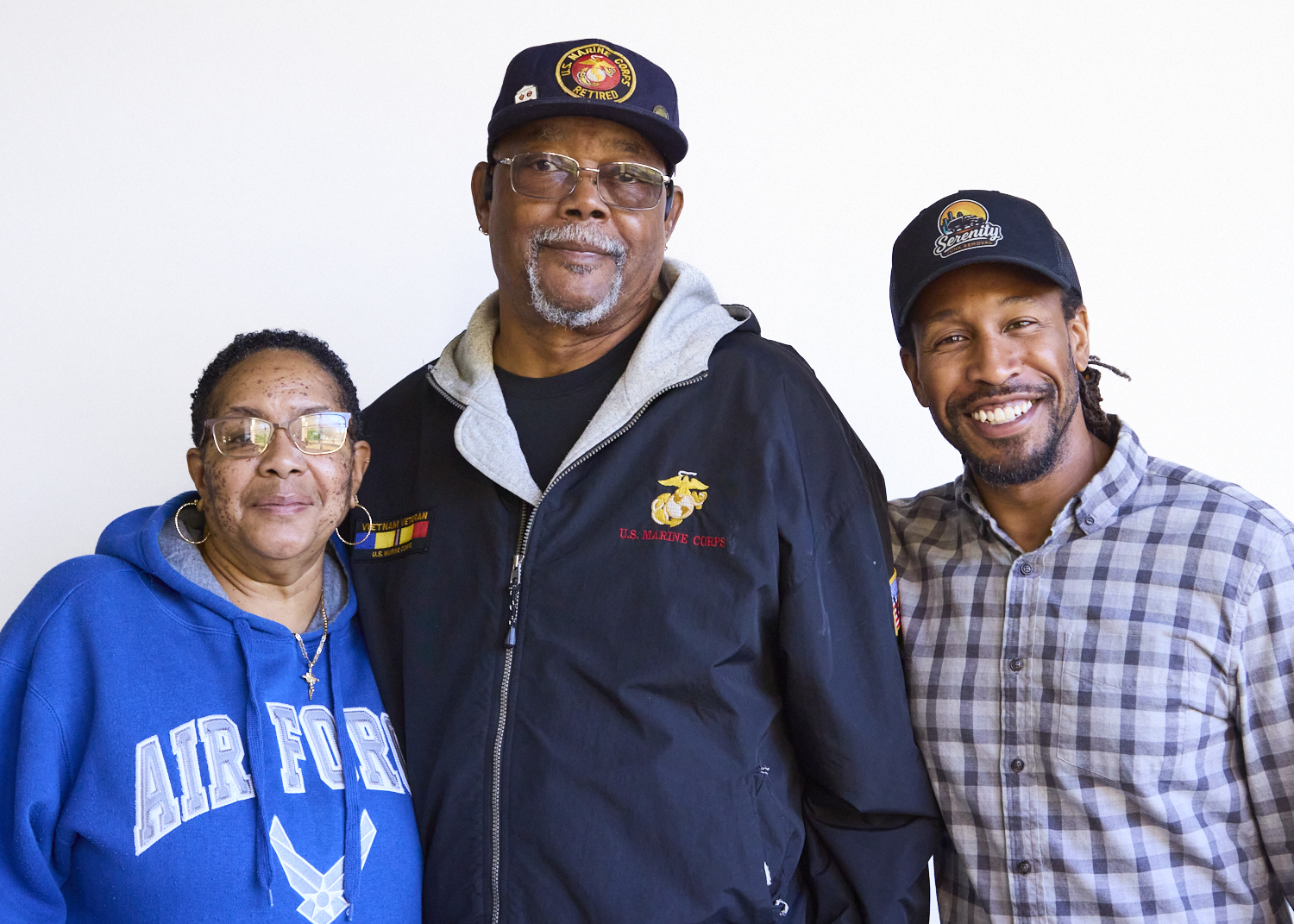When Kaitlin Bensch describes her daughter Grace, she doesn’t begin with a diagnosis. She talks about the music Grace loves, the way Grace’s big brother Wells sings songs to her, and how the family gathers around the dinner table each night, making sure Grace is included in every moment—even if their version of normal looks different from most.
Grace has never been able to walk or talk. She spends her days surrounded by music and day care, the laughter of her family, and the gentle presence of her brother, whose “helping heart” makes their sibling bond unique. Though their playtime doesn’t resemble that of most siblings, it is no less meaningful. But behind these everyday moments is a reality few families ever face.
Grace has Infantile Neuroaxonal Dystrophy (INAD), an extremely rare genetic disorder affecting only about 150 children worldwide. INAD slowly robs children of their abilities, such as walking, seeing, hearing, even eating and breathing. It is terminal, with a life expectancy of 5-10 years, and its rarity leaves families with more questions than answers.
The long road to diagnosis began before Grace’s first birthday. Kaitlin’s instincts told her something was not right. Instead of meeting developmental milestones, Grace was regressing. She was not moving as easily as she used to, she was no longer crawling, and she could not do many of the things that Kaitlin had expected. Kaitlin knew that she needed to connect her daughter with early intervention resources as soon as possible.
After countless therapies, doctor’s appointments, and visits to specialists, Grace was still not progressing. It was decided that Grace should receive a full genetic test. And finally, after months upon months of searching for answers, the Bensch family received Grace’s diagnosis: Infantile Neuroaxonal Dystrophy.
The diagnosis felt isolating, almost impossible to comprehend. But Kaitlin refused to let it define her daughter’s life. The very next day, she reached out for help—prompted by another mother who gently urged her to call Cardinal Kids. That call, Kaitlin says, “changed everything.”
Cardinal Kids exists to walk beside the Bensch family, providing guidance, comfort, and expertise during the most uncertain times.
In November 2023, the Cardinal Kids team visited the Bensch home to begin palliative care for Grace. It was soon after that Grace connected with Kayla Overstreet, Cardinal Kids Nurse Practitioner, who closely follows Grace and her disease progress. By this fall, Grace will have been under Cardinal Kids Palliative Care for two years. Kaitlin had never heard the words “Palliative Care” before. At first, the words frightened her. Most people who think about hospice think about old people, not something that a mother has to consider for their child.
But professionals like Kayla have helped ease the family’s concerns and shifted their understanding of what palliative care can mean for them.
Grace is not showing serious regressions every time the palliative care team makes a visit. When Kaitlin does want answers about Grace’s symptoms, Kayla has been there to talk with them, find the best way to manage Grace’s pain, and navigate medications.
Kayla also encourages opportunities for the Bensch family to sit down with the palliative care team and discuss their personal goals for their daughter’s life.
Some of the questions they discuss are:
- What are your goals for your daughter and family?
- What does this specific medical intervention mean?
- What will it look like for your family?
- How will it help your child, and will it help promote quality of life?
Kaitlin appreciates not only the level of compassion that was shown to her family when they had to think about those hard things, but also the clear communication regarding what she and her husband needed to decide upon together.
“It’s not done in a negative way at all, but in an empowering way,” Kaitlin says, “as in, ‘We want you to be prepared for the things to come, and we want to address it in a way that you have both decided you feel comfortable with’.”
Kaitlin would rather know everything she can about Grace’s condition than to come across an unexpected symptom and be thrown into shock. She feels that not just anybody can help her understand what the future holds—but the Cardinal Kids team is skilled at preparing their family for each season, and, when the time comes, Grace’s transition into Hospice Care. Most importantly, the team ensures that every visit aligns with the family’s wishes for Grace’s quality of life.
Kaitlin’s mission of advocacy goes beyond their relationship with Cardinal Kids. Determined to support others who face rare pediatric diseases, she created a golf tournament, now held annually around Grace’s birthday.
“People want to help, but they don’t always know how. The tournament gives them a way—whether it’s support for local families or supporting organizations like Carolina Caring that make this kind of care possible.”
Kaitlin Bensch
Carolina Caring‘s tournament is more than a fundraiser. It is a way to honor Grace’s life and ensure her story continues to impact others.
“I can’t just sit around here and feel sad,” Kaitlin says. “I have to make her story matter.”
That story is one of courage, community, and unwavering love. It is a story of parents who choose quality of life over fear, who find strength in compassionate care, and who make sure that Grace’s journey is defined by seeking joy in all things.
As Kaitlin concludes, “We are a family who is navigating something unimaginable, and if we didn’t have a palliative care team, I wouldn’t feel as secure about taking care of Grace…I would feel alone and scared. I feel much more empowered with this team by my side.”

